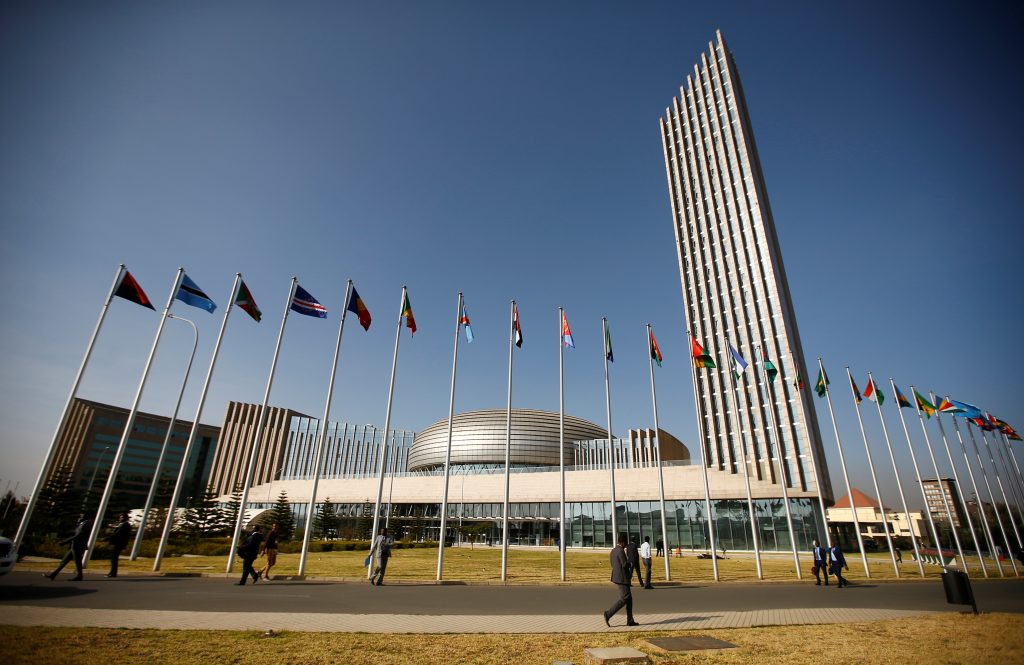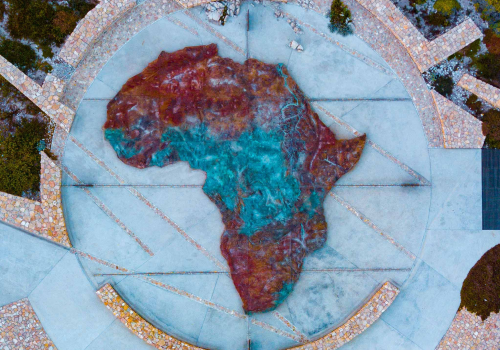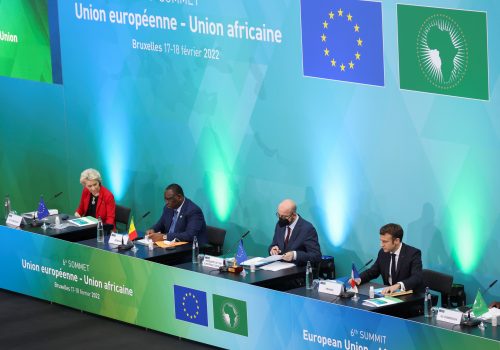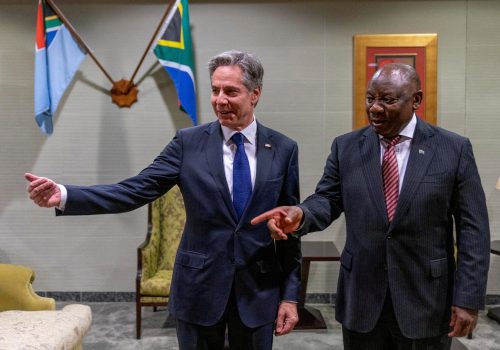A delegation of African presidents and diplomats—from Senegal, Uganda, Egypt, Republic of Congo, Zambia, and South Africa—will soon present Russian President Vladimir Putin and Ukrainian President Volodymyr Zelenskyy, in Moscow and Kyiv respectively, a peace plan for ending Russia’s war on Ukraine.
The initiative is rare enough to draw some sarcasm about African presidents who are seeking to stop a European war when they can’t stop wars closer to home. For those critics—who overlook the work done in an effort to end the conflict in Ethiopia last year—it is hard to remember the last time such a delegation of African presidents assembled together to respond to a war on African soil. They point to cases in Khartoum, Sudan, and Goma, the Democratic Republic of the Congo, where any conflict-resolution efforts were ineffectual.
Other observers see this new delegation of African leaders as an attempt by South Africa to distract people from troubles at home. The announcement of the delegation came just days after US Ambassador to South Africa Reuben Brigety’s allegation that a Russian cargo ship stocked up on ammunition and arms at a port in Cape Town in December 2022.
The recent (albeit cautious) support from United Nations Secretary-General António Guterres, Washington, and European capitals—along with the varied geopolitical positions of these African countries—lent enough credit to the initiative to give it a chance. In the United Nations General Assembly’s recent vote to condemn Russia over its invasion of Ukraine—held on February 23 this year, around the one-year mark of the full-scale invasion—thirty African countries voted to condemn Russia, twenty-two countries abstained, and two supported Russia. These African leaders, representing both countries who voted to condemn Russia and countries who abstained, form the optimal group to propose a peace plan, as several of them see this as an opportunity to justify their varied positions—including neutrality—and find a diplomatic end to the war.
What does this peace plan say? Frankly, not much—at the moment. South African President Cyril Ramaphosa spoke of vague preparations and of having separate phone calls, but avoided critical details. Russian Foreign Minister Sergei Lavrov said he was looking forward to seeing the delegation’s “concrete initiatives.”
What African leaders are weighing
Russia’s links to the African continent date back to the Cold War and a desire to support communist regimes (in places such as Guinea, Congo, and Ethiopia) and social-democratic or socialist political movements (in places such as South Africa, Angola, Mozambique, and Zimbabwe). The Soviet Union deployed forty thousand advisers across Africa between 1970 and 1975, and, over the course of the Cold War, received about sixty thousand African students—notably at the Patrice Lumumba Peoples’ Friendship University of Russia, which drew students from developing countries across the world. Some major African infrastructure projects are products of partnerships with the Soviet Union, Russia, or Russian companies. Those include the Aswan Dam in Egypt, the Capanda hydroelectric dam, and power plants planned in Congo and Nigeria. These are all countries that Putin hopes to rely on in order to find the support he lacks in the Global North.
Yet, while the USSR and, later, Russia have supported Africa in these ways, Africans are unlikely to blindly align themselves with Russia. It is impossible to ignore that previous support was more inspired by a desire to compete against the United States than by a love for freedom or Africa. Today, outside observers and African publics alike cannot ignore the humanitarian cost posed by Russia’s Wagner Group militias in the Sahel, Libya, the Central African Republic, or Mozambique. It is also difficult to see African youth seduced by the Russian way of life rather than the American dream, the latter of which has been able to increase its appeal to African youth via Netflix and Silicon Valley.
In fact, even if the West can’t see what Russians could seriously offer to Africans now, it has not been very difficult for Russia to fuel the very real African resentment towards the West. For Russia and the West, Africa is a coveted asset—one that holds 28 percent of the votes at the United Nations. In the post-Cold War period, Ukraine had neither the resources nor the geopolitical interest to engage in Africa like Russia did. That gave Russian views justifying aggression a hearing in Africa that it otherwise would not have received.
The complicated relations between African countries and also between African countries and global competitors such as Russia, the United States, and others leaves African policymakers in a bind. Those policymakers must carefully balance their economic interests and historical ties.
Further complicating the choice for African policymakers is the overwhelming US and Western support for Ukraine, in contrast to the lack of support and attention for African countries facing conflict. African countries, out of national interest, are looking to diversify their partnerships; they will need to balance their specific needs and local contexts in this geopolitical chaos.
A change in the narrative
The delegation of African presidents aiming to bring an end to Russia’s war in Ukraine offers a unique opportunity for these leaders to be a part of the solution to a global problem and no longer rest on the sidelines of geopolitics as collateral victims.
Russia’s full-scale invasion of Ukraine caused a considerable increase in the price of grains, worsening food security particularly in the Horn of Africa; at the same time,it has also allowed Africa to step up as an alternative producer of some critical goods. For example in the energy sector, as Europe diversified away from Russian energy supplies, Africa helped fill the void, with Algeria now among the top four exporters of gas to Europe and with Egypt also bolstering its gas-export capacity, according to its Ministry of Petroleum and Mineral Resources. Recent hydrocarbon discoveries in Senegal and Mozambique are set to come online in the years ahead. These significant actions show that Africa is playing a leadership role and refusing to sit on the sidelines as a victim of geopolitical fallout.
Africa has the peace and conflict-resolution experience to put forward in ending Eastern Europe’s geopolitical crisis. Even if African efforts have not always been successful, these efforts are valuable; the leaders behind them still have crucial experience in conflict management. Some might argue that the existence of countless conflict resolution tools, demobilization programs, peace-building mechanisms, and strategic frameworks such as the Peace and Security Council of the African Union indicate that African leaders fail to settle the conflicts and wars happening in their own countries; but in reality, the existence of these initiatives shows that African leaders have created dialogue where there were voids, demobilized fighters so they could return home, and, in some cases, helped societies address the horrors of war and build a lasting peace. Several of the leaders in the African peace delegation have participated in responding to violent conflict or have worked to end conflict. That experience may be usefully applied to Russia’s war on Ukraine.
By bringing the unique peace initiative together, African presidents are attempting to advance their leadership on the global stage. This is an incredible challenge for a continent that has often been applauded for its potential, but which must now deliver.
Rama Yade is the senior director of the Atlantic Council’s Africa Center and a senior fellow at the Europe Center. She is a professor at Sciences Po Paris and Mohammed 6 Polytechnic University in Morocco. She was a member of the French cabinet, serving as deputy minister for foreign affairs and human rights and ambassador to UNESCO.

The Africa Center works to promote dynamic geopolitical partnerships with African states and to redirect US and European policy priorities toward strengthening security and bolstering economic growth and prosperity on the continent.
Image: A general view shows the headquarters of the African Union (AU) building in Ethiopia's capital Addis Ababa, January 29, 2017. REUTERS/Tiksa Negeri



